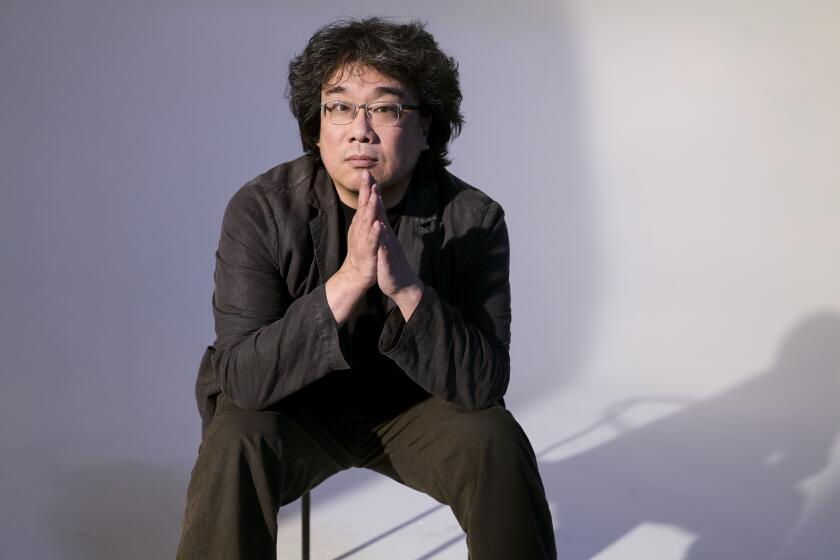‘The Mirror’ an Illuminating, Graceful Tale of Modern Iran
- Share via
“The Mirror” marks a most welcome return of writer-director Jafar Panahi, whose 1995 “The White Balloon” became an international breakthrough for the Iranian cinema with its simple tale of how a little girl’s errand to buy a goldfish to celebrate the New Year turns into a revealing odyssey.
Panahi’s new film is similar to “The White Balloon” yet even more illuminating of Islamic society. It’s the latest in a group of recent powerful films, including the Oscar-nominated “Children of Heaven” and “The Apple,” in which Iranian filmmakers, working in a severely proscribed national cinema, have focused on children as a way of dealing with the realities of life in present-day Iran. This focus on youngsters, however, is nothing new in the Iranian cinema, reaching back more than 20 years to “The Mina Cycle,” a bleak allegory of life under the Shah, and “The Runner,” which dared to suggest that for the dispossessed, life could be just as hard under Khomeini as it was under the Pahlevi dynasty.
Panahi picks out Mina (Mina Mohammad-Khani), a first-grader with her left arm in a cast and a sling, among a group of children outside a Tehran primary school that has just let out for the day. The crowd of youngsters quickly thins, with Mina beginning to wonder why her mother hasn’t yet picked her up. As time passes and Mina grows more worried she at last decides to try to get home by herself.
In the first half of the film Mina’s frustrations escalate as she becomes increasingly lost, despite the many adults she encounters, some of them too distracted to give her full attention, others kind but lacking enough information to be able to guide her. Eventually, Mina does figure out the right bus line to take--but takes a bus going the wrong direction. The driver sees to it that she’s headed in the right direction, but the last straw occurs when the driver of the correct bus tells her she must get off and enter the rear door, reserved for women.
At this point the tenacious little Mohammad-Khani rebels against her role, propelling the film into an unpredictable direction--and underlining its revelation of the status of women in Iran.
Panahi’s great gift is that he allows meaning to flow from his material rather than imposing it from the outside. The simple fact of Mina’s gender provides a perspective for all the conversations among adults overheard in the film.
On the first of various buses Mina boards is an old woman who feels in limbo, unwanted by her son’s family for fear her little grandson will pick up her rural accent yet afraid to seek shelter with her daughter because of her uncertainty over how her son-in-law would receive her. At another point we overhear a married couple quarreling in a car; the wife declares that women are not slaves while the husband, tacitly agreeing, says they nonetheless must run the home. He contends further that a woman’s salary is eaten up by the cost of her wardrobe and a baby-sitter, adding that a real man, by working just one extra hour a day, can equal a woman’s paycheck for an entire week, thereby justifying her staying home full time, whether she likes it or not.
The wife’s outspokenness echoes Mina’s fiercely independent spirit, leaving us to ponder her as a possible foreshadowing of an Iran in which women, even under Islamic rule, will win greater opportunity and equality. In a very real way Mina may be holding up a mirror to the future as well as the present.
All of these thoughts are evoked by Panahi with ease and spontaneity in his graceful, fluid film that captures so well the vitality of everyday life in bustling Tehran, a vast, sprawling maze of a city, punctuated by large squares--just the kind of metropolis in which anyone, especially a child, can easily lose his or her way. Yet Panahi leaves us with the feeling that Mohammad-Khani, already a formidable actress, can take care of herself.
* Unrated. Times guidelines: suitable for all ages.
‘The Mirror’
Mina Mohammad-Khani: Mina
A Cowboy Booking International release. Writer-director-editor Jafar Panahi. Producers Panahi, V. Nikkhah-Azad. Camera F. Jodat. In Farsi, with English subtitles. Running time: 1 hour, 41 minutes.
Exclusively at the Nuart through Thursday, 11272 Santa Monica Blvd., West Los Angeles, (310) 478-6379.
More to Read
Only good movies
Get the Indie Focus newsletter, Mark Olsen's weekly guide to the world of cinema.
You may occasionally receive promotional content from the Los Angeles Times.










